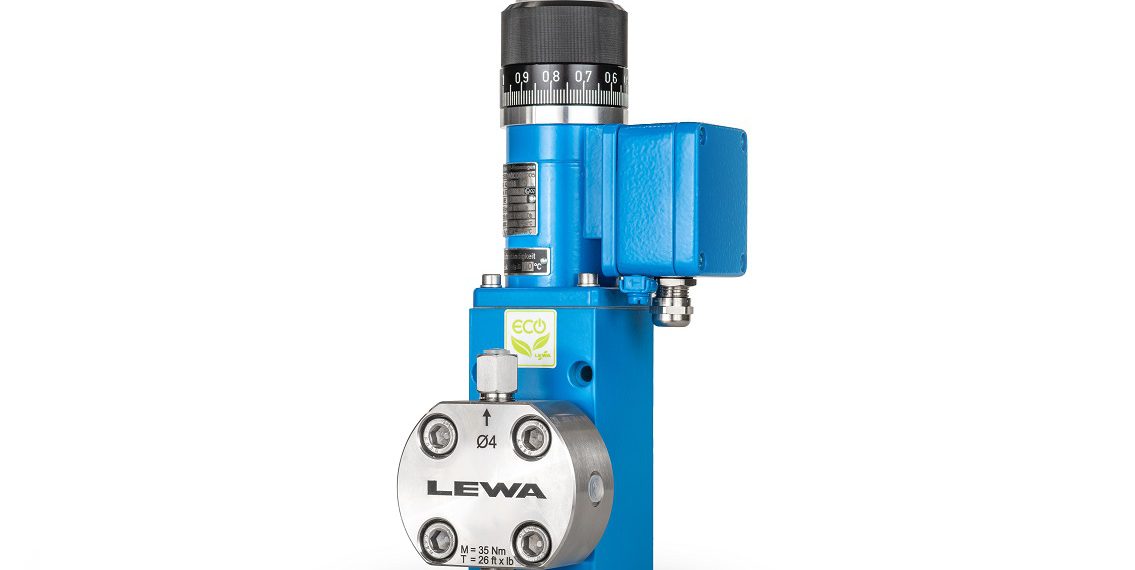According to the German Energy Agency (dena), biomethane production in Germany may increase as much as ten times over – from currently 9 terawatt hours to about 100 – by 2050. What is more, natural gas is the most important energy source for private households and accounts for 44 percent of the heating market. Before natural gas or biogas is fed into commercial supply networks, it must have an odorant added to it. Odorants serve as a warning in case of leakage. Since the last few years have been marked by a trend toward decentralized production, Lewa has added the MAH 4 size to its micro-metering pump portfolio as a proactive measure for meeting the expected increase in demand. The new unit can be used for odorizing with mercaptans or tetrahydrothiophene at a throughput rate of up to 12,500 Nm³/h. The pump covers the flow range from 200 to 250 ml and can be used as a cost-effective solution in accordance with DIN-EN 1333 for gas networks up to PM 16. At this year’s Gat/Wat trade fair, the company is presenting the new pump model for biogas, natural gas, and liquefied petroleum gas odorizing systems alongside many other products in hall 07 at booth C016.
“Back in early 2018, we started getting more requests for odorizing gas volumes of approximately 12,500 Nm³/h, to the point where it just made sense to design a pump specifically for that amount,” said Walter Richter, Sales Manager for Gas Odorization at Lewa. “The right way for us to respond to this trend was to add an intermediate size, the MAH 4, to our hydraulically actuated and solenoid driven micro-metering pumps from the MAH, MBH, and MLM series. The new size meets the requirements for this range exactly.” The new unit closes the gap between the MAH 3 and the MAH 5 – something that had previously been done using the larger MLM 15 series. However, the stronger stroke solenoid made that design over-dimensioned and less cost-efficient in some cases. Neither the MAH 3 nor the MAH 5 units from the same series were cut out for the job. There was always one of two problems: either they could not manage to pump at the required output of 16 bar, or they could manage a sufficient flow rate at 600 ml but were not designed for the necessary discharge pressure.
The MAH 4 micro-metering pump as a cost-efficient solution
The pump experts at Lewaclosed a gap in the series by developing this unit. The MAH 4 makes it possible to odorize gas volumes of up to 12,500 Nm³/h with precise metering and in a flow range of 200 to 250 ml. Like all solenoid-driven diaphragm metering pumps from Lewa, the MAH 4 also consists of an electromagnetic drive with stroke setting, a pump head with metal diaphragm and a control system contained in a separate housing. “The metering pump is actuated with pulses,” explained Richter. “The discharge stroke is executed by the armature of the magnet. The suction stroke takes place after switching off the electrical pulse using the force of the thrust spring.” The highly reliable, robust pump features a safety switch. An overload – due to a closed valve in the discharge line, for example – automatically leads to magnet standstill, as its force is limited. “In the worst case, a closed valve in the suction line would, cause cavitation,” Richter added. “After the faults are remedied, the pump simply continues pumping.”
Under the same basic conditions, the MAH 4 stands out for its metering accuracy of ± 1 percent and, thanks to the wide control range up to 1:1,000, outstandingly high metering flexibility. Further, its design is absolutely odor-tight and leakage-free, safe from dry runs and features high process reliability. The only difference between the new MAH 4 and the proven MAH 5 is that the new size has a different inner diameter for the plunger and bushing. Both dimensions were reduced from 5 to 4 mm. Thanks to the adjustments and optimizations made to those dimensions, the MAH 4 serves as a cost-efficient solution for the specific range of applications and is perfect for its requirements.
Lewa at Gat/Wat 2019: hall C, Stand C016

















